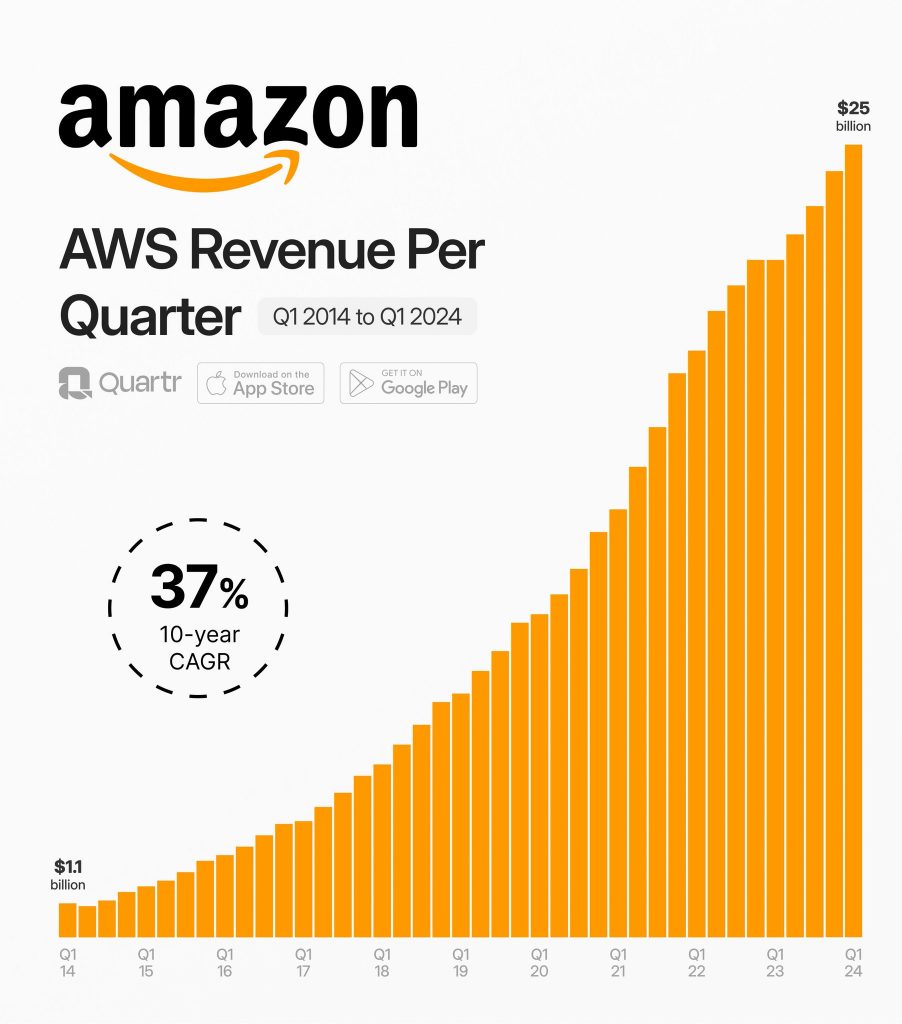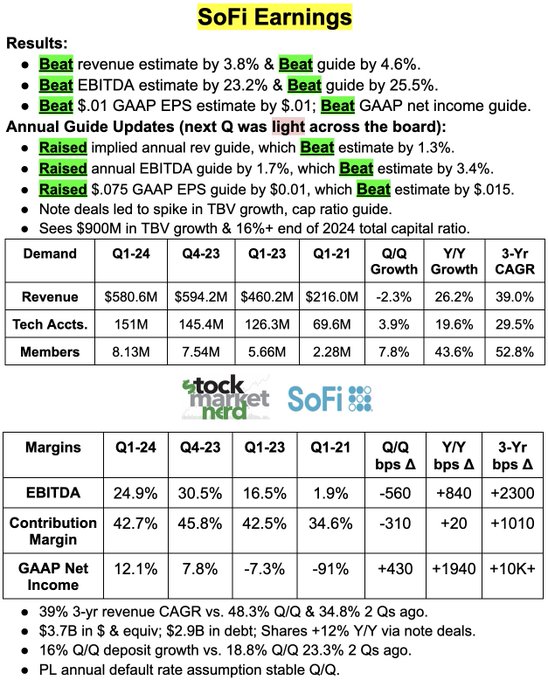This is an amazing interview from Harry Stebbings from 20VC with Keith Rabois of Khosla Ventures and Eric Glyman from Ramp on driving efficiency, tools and various other ramblings.
Its a great interview overall!
Tech, Business, Finance and Everything Else
Revenue +13%
*Online Stores +7%
*Physical Stores +6%
*Third Party Sellers +16%
*Subscriptions +11%
*Advertising +24%
*AWS +17%
EBIT +221%
*marg. 10.7% (3.7)
EPS +219%
FCF LTM $50.1B (-3.3)

Its here!
MKBHD reviews the Rabbit R1.
This is the pinnacle of a trend that’s been annoying for years: Delivering barely finished products to win a “race” and then continuing to build them after charging full price. Games, phones, cars, now AI in a box
90% of VCs add no value to startups, 70% even harm them.
Just the fact that you got an MBA and joined a venture fund doesn’t mean you can give useful advice to an entrepreneur
If you never built an actual business, you’re not qualified to give advice.
Vinod Khosla is the lead of Khosla Ventures and has invested in some of the worlds largest companies when they were young and in venture capital mode.
Here is the full interview:

Here is a quick run down the SoFi results this quarter.
From the outside it looks like they had a very strong quarter with 26.2% growth in terms of revenues and members are very strong at 43% up year on year.
However, the stock itself is a crazy rise and very hard to predict how it is going to perform over the short term.
GitHub Copilot Workspace is here!
GitHub Copilot Workspace leverages AI developer tools to streamline complex tasks across your entire repo, enhancing developer productivity and making coding faster and smarter. Ideal for navigating unfamiliar programming languages or frameworks, Copilot Workspace acts as a cloud IDE companion, deeply integrated with your project. As your ultimate coding partner, it excels in repo-wide edits and fosters programming collaboration. Whether addressing GitHub Issues or optimizing your task-centric workflow, Copilot Workspace is designed to improve your coding efficiency through its AI-generated code capabilities.
GitHub Copilot Workspace is going to be a great addition to GitHub. AI tools are becoming more important for coding as other tools like OpenAI have helped push the boundaries and are bringing more efficiency to coding.
I’m bullish on GitHub and I think they are going to continue to grow even further and faster over the next 10 years.
Rabbit has just released their new handheld AI device the Rabbit R1. Above is the best review I could find at the moment of the R1 (its from iJustine).
I’m a big fan of this device and have ordered my own, but it probably wont come for some time.
Anyways, take a look at the review and it would be great to hear your thoughts and comments on the Rabbit R1
Determining the “absolute easiest” DAW for beginners can be subjective, as individual learning styles and preferences vary. However, based on user feedback and general ease of use, some beginner-friendly DAW options include:
1. GarageBand (Mac only):
2. Ableton Live:
Customers appreciate Figma for several reasons, making it a popular choice for design teams and individuals:
Collaboration:
User-friendliness:
Features and Functionality:
Additional factors contributing to Figma’s popularity:
While both Notion Calendar and Google Calendar are effective tools for managing your schedule, they cater to different needs and offer unique benefits. Here’s a breakdown of some advantages Notion Calendar might have over Google Calendar:
Integrated Workspace:
Customization:
Flexibility and Functionality:
Offline Accessibility:
However, it’s important to consider some potential drawbacks of Notion Calendar:
Buying Xiaomi American Depositary Receipts (ADRs):
Buying Xiaomi shares directly on the Hong Kong Stock Exchange (HKEX):
Accenture announced today that it will acquire the learning platform, Udacity. This acquisition is part of an initiative to create a learning platform focused on AI, in response to increasing interest in the field. While the acquisition price for Udacity was not disclosed, Accenture also announced a $1 billion investment in a technology learning platform named LearnVantage.
Although the company could offer broader technology training, it underscored its interest in providing training for AI. Kishore Durg, the global lead of Accenture LearnVantage, said in a statement, “The rise of generative AI represents one of the most transformative changes in how work gets done. It’s driving a growing need for enterprises to train and upskill people in cloud, data, and AI as they build their digital core and reinvent their enterprises.”
Distrokid and RouteNote are both great options for uploading your music into the worlds largest stores and streaming services. Here is a quick list of Pros and Cons for both.
DistroKid:
Pros:
Cons:
RouteNote:
Pros:
Cons:

Investments in AI have been increasing, and Alibaba has emerged as one of China’s key players in this field. Recently, the e-commerce giant led a funding round of over US$600 million for the Chinese startup MiniMax.
This deal increased MiniMax’s valuation to over US$2.5 billion, marking Alibaba’s second significant AI investment this year. It recently led a US$1 billion round for Moonshot AI, also valuing it at US$2.5 billion.
MiniMax is a Chinese AI startup specializing in social AI. It develops AI companions and virtual characters for interactive experiences.
At present, the startup has two AI character role-playing apps: Talkie for international markets, and Xing Ye for China.
Cox Enterprises is set to acquire OpenGov, a software provider for cities and state agencies, in a deal valued at $1.8 billion. OpenGov, a privately-owned company based in San Francisco, has developed a software platform over the past twelve years. This platform assists with budgeting, accounting, asset management, and other local government requirements.
While Salesforce doesn’t publicly disclose an official list of their “biggest” clients, here are some of the prominent companies and organizations known to be Salesforce customers, highlighting the diverse range of industries they serve:
Large Enterprises:
Public Sector and Non-profits:
Smaller Businesses:
Additional Considerations:
The News: Online brokerage Webull is planning to go public via a $7.3 billion merger with a special purpose acquisition company (SPAC), after previous initial public offering (IPO) attempts were unsuccessful, partly due to its past crypto offerings.
Details: The New York-based company, which launched its trading platform in the U.S. in 2018, has agreed to merge with SK Growth Opportunities Corp. The company plans to start trading on the Nasdaq in the second half of 2024, giving Webull an estimated enterprise value of roughly $7.3 billion.
Webull’s U.S. CEO, Anthony Denier, stated that the company’s previous attempts to IPO were hindered by its cryptocurrency trading offerings, a practice the SEC has frowned upon. To eliminate this regulatory uncertainty and clear the path for its public listing, Webull sold its crypto asset business in late 2023.
Why SPAC?: Denier explained that the SPAC route provides a more certain valuation upfront compared to a traditional IPO. The blank-check deal is expected to raise approximately $100 million for Webull, which it intends to use for international expansion and new product development.
Webull experienced significant growth during the pandemic, with registered users reaching 20 million worldwide. The company has targeted more active traders than competitors like Robinhood, offering tools for technical analysis.
It’s important to note that this impending public listing occurs as fintechs proceed cautiously due to increased regulatory scrutiny of companies with ties to China. Despite early backing from Chinese tech giants Xiaomi and Alibaba, Denier emphasized that Webull is not majority-owned by Chinese entities.
Duolingo, the popular language learning platform, has recently made the decision to reduce its contractor workforce by 10%. This move comes as the company shifts its focus towards integrating artificial intelligence (AI) into its language learning programs.
The decision to cut contractors was driven by Duolingo’s desire to leverage AI technology to enhance its language learning experience. By utilizing AI algorithms, Duolingo aims to provide personalized and adaptive language instruction to its users.
While the reduction in contractor workforce may lead to some short-term challenges, Duolingo believes that the long-term benefits of AI integration will outweigh the initial impact. The company anticipates that AI-powered features will enable users to learn languages more efficiently and effectively.
Twilio’s ownership structure features a mix of institutional and individual investors, with several holding sizeable stakes. Here are the top shareholders as of January 8, 2024:
Institutional Shareholders:
Individual Shareholders:
SoundCloud’s ownership situation is currently in a state of flux, with potential changes on the horizon:
Current Shareholders:
Potential Sale: